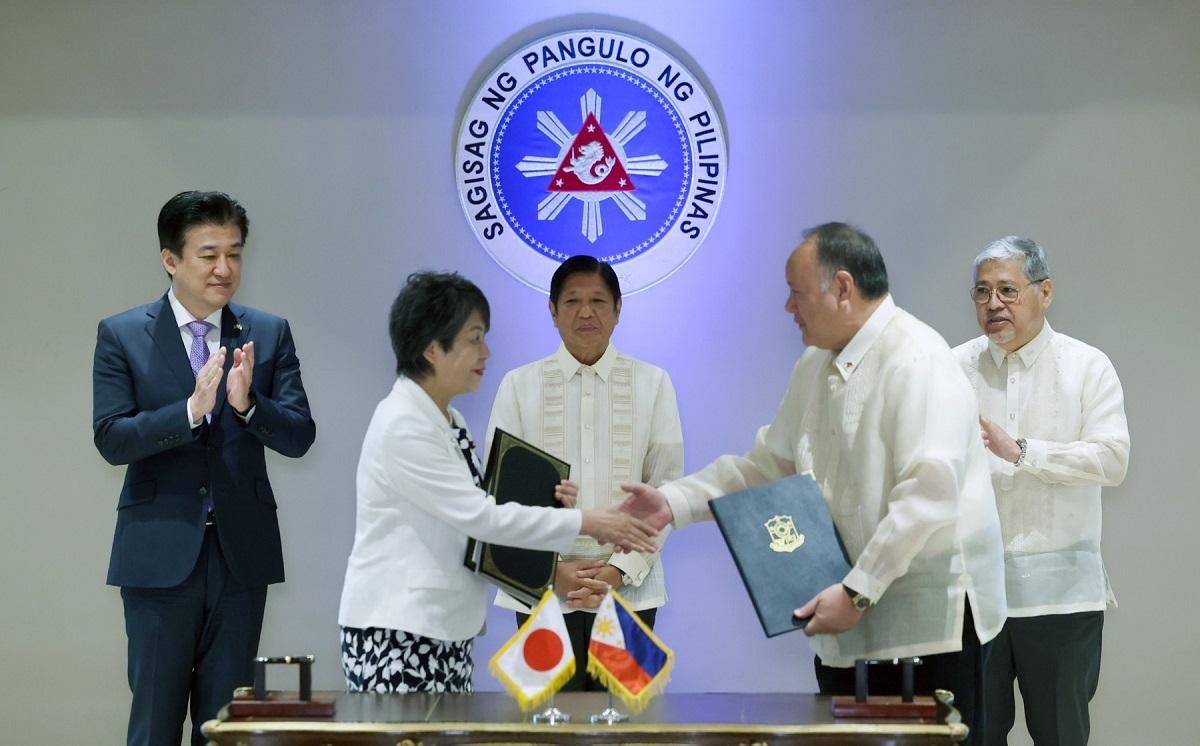PH, Japan ink landmark Reciprocal Access Agreement

The Philippines and Japan on Monday signed the landmark Reciprocal Access Agreement (RAA), which aims to heighten defense cooperation between the two countries in the middle of the escalating tensions in the South China Sea.
Together with key government officials, President Ferdinand ''Bongbong'' Marcos Jr. witnessed the signing of the deal at the Heroes' Hall of Malacañan Palace.
The signing came after the courtesy call of Japanese Foreign Minister Kamikawa Yoko and Defense Minister Kihara Minoru on Marcos.
The agreement was signed by Japanese Foreign Minister Yoko and Philippine Defense Secretary Gilberto Teodoro Jr.
The first formal negotiations on the RAA were held in Tokyo in November last year. It was led by the Department of National Defense (DND) along with the other delegations from the Department of Foreign Affairs (DFA) and the Department of Justice (DOJ).
A virtual line-by-line reading of the RAA main text, the Agreed Minutes, and two records of discussions were held on June 11, according to the Presidential Communications Office (PCO).
Earlier reports said the agreement would allow more Japanese forces to join annual military exercises involving the Philippines and the US, including the "Balikatan" exercises.
The deal will also allow Japanese forces to provide humanitarian assistance to the Philippines when needed.
The newly-signed agreement still needs the ratification of the Philippine Senate and the National Legislature of Japan before it takes effect.
Senate President Francis ''Chiz'' Escudero has expressed support over the defense agreement.
''Anything that strengthens and increases our military's capability is a deterrence to a possible conflagration,'' Escudero said.
Agreement to be scrutinized
Meanwhile, Senate Committee on Foreign Relations chairperson Imee Marcos welcomed the newly-signed pact but vowed that her panel would scrutinize the agreement to guarantee that it will protect the country's interest.
''We welcome having stronger security ties with our neighbors in the Asia-Pacific region. However, as with other treaties, the Senate Committee on Foreign Relations will scrutinize every line and every word of that treaty once the same is referred to us to make sure that it is aligned with the national interest of the country,'' Marcos, the President's sister, said.
For his part, Senate Committee on National Defense chairperson Jinggoy Estrada said the signing of the deal ''demonstrates the mutual commitment of Japan and the Philippines to uphold a rules-based international order, particularly in response to regional security threats.''
''Aside from joint military exercises, the RAA plays a crucial role in coordinating humanitarian assistance and disaster relief operations, given the frequent occurrence of natural disasters in the region requiring rapid and coordinated response efforts,'' he said.
Estrada said he would ensure that the ratification of the RAA would be among the priority agenda of the chamber when it opens the 3rd Regular Session this July.
Article VII, Section 21 of the 1987 Constitution states that “no treaty or international agreement shall be valid and effective unless concurred in by at least two-thirds of all the Members of the Senate.”
Senator Juan Miguel Zubiri said the deal is ''a partnership of like-minded nations that will truly bolster the country’s naval training and use of ships and equipment purchased from Japan.''
Vocal
Japan has been vocal in expressing alarm over the rising tensions in the South China Sea, noting that the peace and stability in the region is an international concern.
The Philippines, China, Taiwan, Vietnam, Malaysia and Brunei have been embroiled in years-long territorial disputes over resource-rich features in the South China Sea.
Beijing has since claimed the waters nearly in its entirety despite an international tribunal ruling on a case filed by the Philippine government, which invalidated such assertion.
Similar to that, Japan has its long-running territorial disputes with China.
Foreign Minister Kamikawa and Defense Minister Kihara are in the Philippines for the 2nd Foreign and Defense Ministerial Meeting (2+2), which is considered as the highest consultative mechanism that aims to deepen security and defense policy coordination between Manila and Tokyo.
The RAA will be like the Visiting Forces Agreement (VFA) the Philippines has with the US.
Marcos, however, has guaranteed that the RAA is "not the same" as the VFA with the US in terms of the custody of erring Japanese servicemen on Philippine soil. — KBK/RSJ, GMA Integrated News




